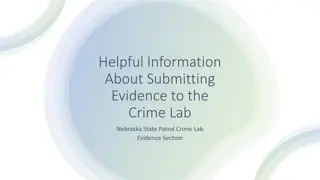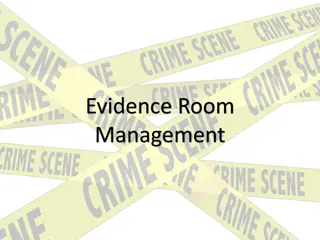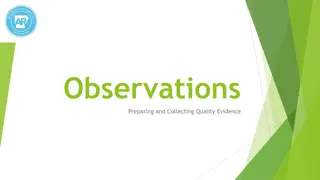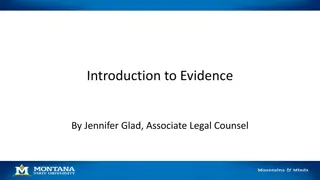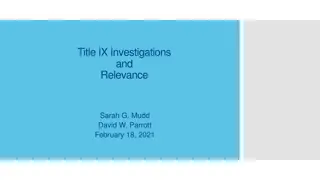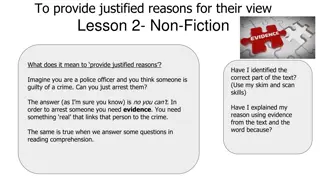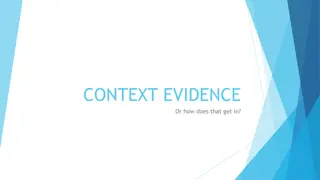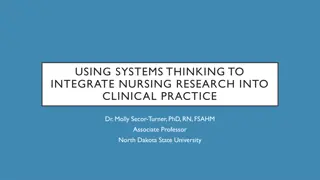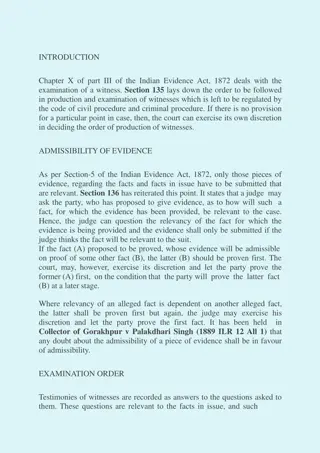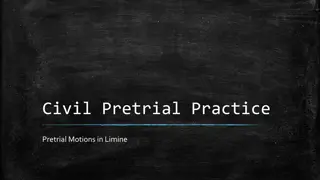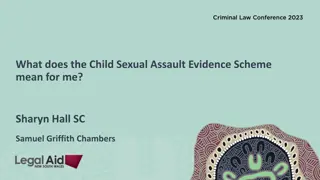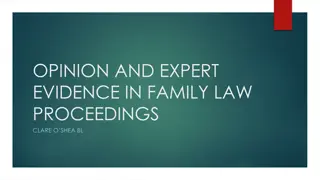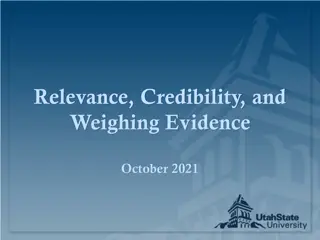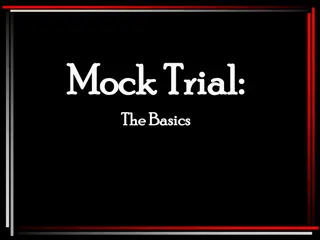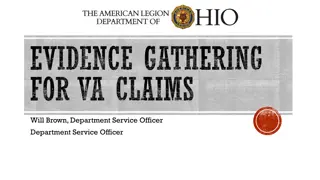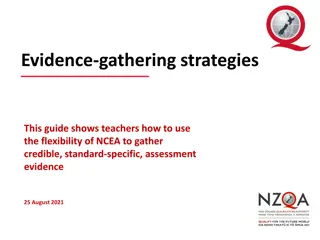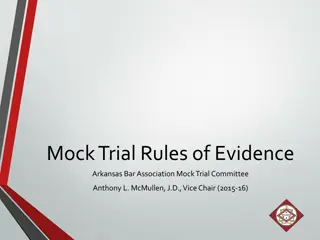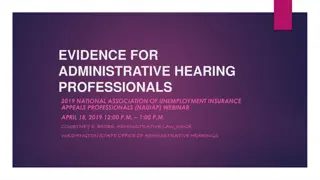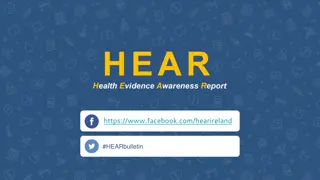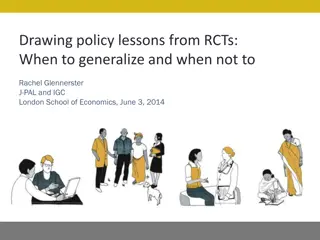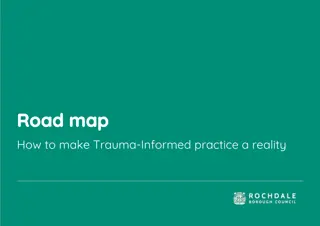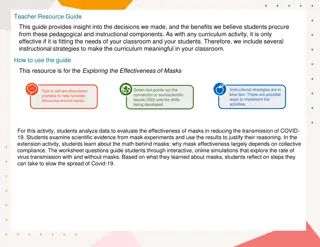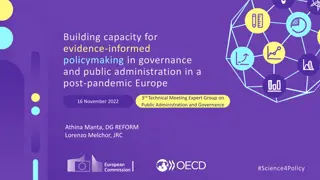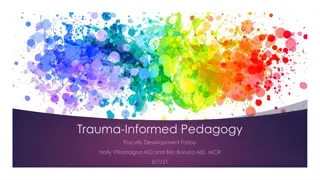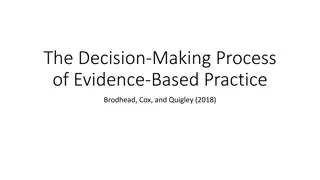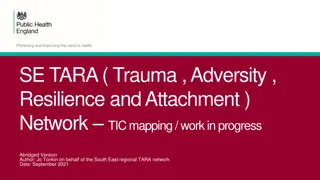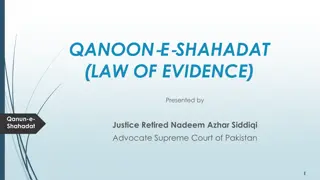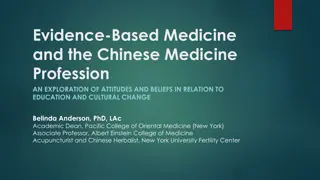The Role of Artifacts and Evidence in Educator Evaluation and Support
Exploring the role of artifacts and evidence in educator evaluation, this content covers the three categories of evidence required by the Oregon Framework. It delves into the efficient process that reduces redundancy, essential components of SLG goals, and the types of evidence relevant to professio
0 views • 15 slides
Understanding Impression Evidence Collection in CSI Investigations
Impression evidence plays a crucial role in investigations, including shoeprints, tool marks, tire tracks, bite marks, and riffling marks on bullets. This evidence can be collected in 2D using photography or tape lifts, and in 3D through casting methods. Differentiating between class and individual
0 views • 21 slides
Helpful Information About Submitting Evidence to the Crime Lab.
Helpful information about submitting evidence to the Nebraska State Patrol Crime Lab's Evidence Section. Learn about the NSP 750 Evidence Submittal Form, submission process, and guidelines for resubmissions. Ensure all necessary details are provided for proper analysis of evidence.
5 views • 16 slides
Illegally obtained evidence
Illegally obtained evidence refers to evidence acquired through unlawful means, such as searches without warrants or extraction under duress. The Fruit of the Poisonous Tree doctrine renders evidence inadmissible if derived from illegally obtained evidence. The Exclusionary Rule prohibits the use of
2 views • 30 slides
Evidence Room Management
Explore the intricacies of evidence room management in a law enforcement setting, including the roles of individuals like Greg Van Buskirk, differences in crime scene management between large and small departments, the distinction between property and evidence, the importance of maintaining chain of
0 views • 8 slides
Enhancing Evidence Collection in Education
Explore the importance of minimizing bias in evidence collection, review different types of evidence, identify strategies to collect quality evidence effectively, understand common biases affecting assessment, and learn to spot and address biased statements. Practice eliminating biased language and
0 views • 11 slides
Understanding Evidence in Investigations
Learn about the principles and types of evidence in investigations, including inculpatory and exculpatory evidence, physical, documentary, demonstrative, and verbal evidence. Explore sources of evidence and the significance of collecting relevant information to ensure a fair investigative process.
0 views • 14 slides
Understanding Title IX Investigations and the Role of Evidence Collection
The purpose of a Title IX investigation is to collect relevant evidence, both inculpatory and exculpatory, to allow for impartial decision-making regarding reported sexual harassment cases. Parties involved must receive sufficient notice and have opportunities to participate, present statements, and
1 views • 32 slides
Providing Justified Reasons in Reading Comprehension
Providing justified reasons in reading comprehension involves using evidence from the text to support one's answer, similar to presenting evidence in a legal case. Just as a police officer needs evidence to make an arrest, readers need textual evidence and the word "because" to support their respons
0 views • 11 slides
Understanding Context Evidence in Legal Proceedings
Context evidence in legal proceedings refers to evidence of acts not charged in the indictment, used to provide a background for understanding specific allegations. This type of evidence is often relied upon by the prosecution to explain events or behaviors that may seem isolated or surprising. It i
1 views • 13 slides
Integrating Nursing Research into Clinical Practice with Systems Thinking
Dr. Molly Secor-Turner emphasizes the importance of evidence-based practice (EBP) in nursing. EBP, derived from rigorous research, leads to quality patient outcomes by aligning services with current knowledge. The process involves identifying problems, critiquing evidence, implementing recommendatio
0 views • 21 slides
Examination of Witnesses under Indian Evidence Act, 1872
Chapter X of Part III of the Indian Evidence Act, 1872, outlines the process of examining witnesses, including the order of production and admissibility of evidence. Sections 135 to 141 delve into the rules governing the examination-in-chief, cross-examination, and re-examination of witnesses, empha
2 views • 8 slides
Understanding Pretrial Motions in Limine in Civil Pretrial Practice
Pretrial motions in limine (MIL) play a crucial role in civil pretrial practice by seeking evidentiary rulings in advance to control the introduction of evidence at trial. These motions aim to prevent the admission of irrelevant, inadmissible, or prejudicial evidence and can also facilitate the intr
2 views • 17 slides
Understanding the Child Sexual Assault Evidence Scheme
The Child Sexual Assault Evidence Scheme is a significant initiative that facilitates child sexual assault trials by introducing witness intermediaries and pre-recording of children's evidence. It applies to prescribed sexual offences and mandates specific provisions for hearings and evidence presen
1 views • 16 slides
Empowering Health Decisions and Care through OHDSI Community Collaboration
OHDSI's mission revolves around improving health by empowering a community to generate evidence that enhances health decisions and care. The journey to real-world evidence involves leveraging patient-level data in source systems and establishing reliable evidence. The OHDSI community is dedicated to
0 views • 5 slides
Understanding Evidence-Based Medicine and Clinical Decision-Making
European Patients Academy on Therapeutic Innovation emphasizes the importance of Evidence-Based Medicine (EBM) in providing optimum clinical care. EBM involves systematic review and utilization of clinical research for informed decision-making, benefiting patients in disease management and treatment
7 views • 20 slides
Expert Opinion and Evidence in Family Law Proceedings
In family law proceedings, witnesses are generally not allowed to give opinions unless they are experts in their field. The Exclusionary Rule prohibits witness opinions to ensure the reliability of evidence presented before the court. However, there are exceptions to this rule, such as expert witnes
0 views • 32 slides
Understanding Relevance, Credibility, and Weighing Evidence in Decision-Making
Explore the importance of relevance and credibility in evidence assessment, the role of hearing panels in evaluating evidence fairly, and the responsibilities they hold. Learn about presenting relevant evidence, policy analysis, and identifying irrelevant evidence to ensure a thorough review process
6 views • 32 slides
Mastering Claims, Evidence, and Warrants for Persuasive Writing
Understanding the concepts of claims, evidence, and warrants is crucial for constructing persuasive arguments. Claims represent positions to persuade, evidence supports claims with facts, and warrants bridge the gap between evidence and claims. An exercise is outlined to help practice forming claims
0 views • 8 slides
Understanding Biased Assimilation and Attitude Polarization in Social Disputes
People with strong opinions on complex social issues tend to interpret evidence in a biased manner, accepting confirming evidence readily while subjecting disconfirming evidence to critical evaluation. This can lead to increased polarization rather than narrowing of disagreement when exposed to the
0 views • 20 slides
Transformation of Quality Assessment Framework in Healthcare
The healthcare quality assessment framework is evolving with a new strategy focused on data-led, people's experiences, care integration, and safety culture. The current framework is transitioning towards a new approach by late 2023, incorporating separate registration and monitoring processes, five
0 views • 14 slides
Understanding the Basics of Mock Trials in the American Justice System
Mock trials in the American justice system involve presenting evidence through witness testimony and physical evidence to help juries or judges determine facts. The process includes witness testimony under oath, examination by attorneys, admission of physical evidence, and closing arguments. The tri
0 views • 38 slides
Understanding Circumstantial Evidence in Legal Proceedings
Circumstantial evidence plays a crucial role in legal proceedings, allowing one to infer facts based on surrounding circumstances rather than direct proof. This type of evidence can be powerful in establishing the guilt or innocence of a person accused of a crime, complementing direct evidence for a
0 views • 39 slides
Understanding Evidence Gathering for VA Claims with The American Legion Department of Ohio
Evidence is crucial for VA claims, and it can come in various forms such as documents, written statements, photos, and video recordings. The framework for evaluating evidence includes factors like relevance, competence, credibility, and weight. Understanding the types of evidence, forms of relevance
0 views • 14 slides
NCEA Evidence-Gathering Strategies for Teachers
This guide explains how teachers can use the flexibility of NCEA to gather credible assessment evidence, tailored to meet student needs. It emphasizes the importance of integrating assessment with learning, producing valid evidence, and ensuring fairness and transparency in assessment practices. Tea
0 views • 19 slides
Understanding Mock Trial Rules of Evidence
Mock Trial Rules of Evidence are crucial for determining the admissibility of testimony and evidence in a trial setting. Students preparing for cases need to assess evidence admissibility, make timely objections, and be prepared to defend testimony. The rules cover objections, specific objections ty
0 views • 36 slides
Administrative Hearing Professionals: Competency and Evidence Considerations
Explore the key aspects of competency objections and evidence considerations in administrative hearings based on a fact scenario involving an employer, a trucking company, and a terminated driver. Learn about witness competency rules, burden of proof, and evaluation of evidence to make informed ruli
0 views • 19 slides
Collaborative Efforts of Irish Health Librarians in Providing Evidence-Based Practice Support
Current awareness newsletter freely available on the internet, providing high-quality, relevant information to healthcare professionals and consumers. This collaboration of Irish health librarians aims to promote evidence-based practice by offering up-to-date information and resources. The conscient
0 views • 12 slides
Making Informed Policy Decisions: Lessons from Randomized Controlled Trials
Policy makers face challenges in decision-making without complete evidence. Drawing on a Bayesian approach to evidence, combining different forms of evidence, and considering contextual factors can aid in designing effective policy interventions. Case studies like non-cash incentives for immunizatio
0 views • 18 slides
Implementing Trauma-Informed Practices: A Strategic Roadmap
This comprehensive roadmap outlines the strategic approach, workstreams, and actions needed to scale and spread trauma-informed practices in Rochdale. It emphasizes design principles, workstream details, and a 12-month action plan to achieve a trauma-informed system. The roadmap aims to engage stake
0 views • 10 slides
Practice and Procedure in Judicial Review: Factual Evidence and Interveners
The content provides valuable insights into the practice and procedure regarding factual evidence and interveners in judicial review cases. It covers general rules, recent cases, applications for oral evidence, questioning witnesses, opinion evidence, and the role of interveners. Key points include
0 views • 28 slides
National Elf Service Launches to Revolutionize Access to Healthcare Evidence
The National Elf Service is introduced as a groundbreaking initiative to address the challenges in accessing and staying updated on healthcare evidence. It aims to combat misinterpretations and gaps in evidence, offering a reliable platform for professionals to stay informed. Through a series of inf
0 views • 14 slides
Exploring Mask Effectiveness in Reducing COVID-19 Transmission
This teacher resource guide discusses activities where students analyze data on mask effectiveness in reducing COVID-19 transmission. It includes experiments, evidence, and discussions to help students make informed decisions about health safety measures. The guide provides strategies for implementi
0 views • 4 slides
Enhancing Evidence-Informed Policy Capacity for Post-Pandemic Europe
The project focuses on building capacity for evidence-informed policymaking in governance and public administration for a post-pandemic Europe. It aims to integrate evidence, science, and evaluation in policymaking to enhance institutional awareness and capacity. The multi-country initiative involve
0 views • 12 slides
Trauma-Informed Supervision Practices and Principles
Explore the concept of trauma-informed care, its principles, and core schemas distorted by trauma. Learn how trauma-informed supervision supports staff experiencing trauma, promotes resiliency, and addresses secondary trauma effects. Discover guiding questions for meaningful conversations and provid
0 views • 17 slides
Exploring Trauma-Informed Pedagogy in Education
The content delves into Trauma-Informed Pedagogy, an emerging approach in education particularly relevant during the COVID-19 era. It discusses core principles, the link to trauma-informed care, and offers insights from a literature review. Key points include recognizing the impact of stress on lear
0 views • 17 slides
Understanding Evidence-Based Practice in Behavior Analysis
Definitions and analogies from the field of medicine help clarify the concept of Evidence-Based Practice (EBP) in Behavior Analysis. EBP involves integrating current best evidence with clinical expertise and client values to make informed decisions. The three-legged stool analogy illustrates the imp
0 views • 32 slides
Understanding Trauma-Informed Care (TIC) and Resilience in the SE TARA Network
This work-in-progress document discusses the aims and objectives of the SE TARA Network in establishing a common language and approach to Trauma-Informed Care (TIC). It highlights strengths and limitations of unifying TIC responses, defines trauma and trauma-informed approaches, and outlines key pri
0 views • 10 slides
Understanding Qanun-e-Shahadat: Law of Evidence in Pakistan
Qanun-e-Shahadat Order 1984 replaced the Evidence Act of 1872 in Pakistan, aiming to align the law of evidence with Islamic principles. This law is crucial for judicial proceedings, governing the admissibility of oral and documentary evidence, primary and secondary evidence, and resolving conflicts
0 views • 22 slides
Attitudes and Beliefs in Evidence-Based Medicine within Chinese Medicine Profession
This exploration delves into attitudes and beliefs regarding evidence-based medicine in the Chinese medicine profession, examining education, cultural change, and perspectives of MD and PCOM students. It covers the history of PCOM-NY's research involvement, current research projects funded by organi
0 views • 26 slides


